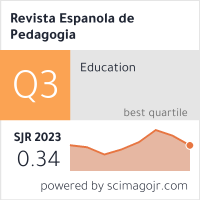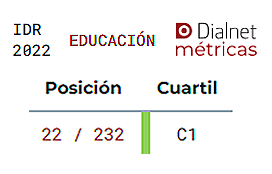Abstract
This paper focuses on the negative or opposite of entropic disintegration as understood in physical sciences and applies this, metaphorically, to the online enterprise. Negentropic behaviours are those that bring re-integration, renewal, and eventual positive states to the institution. Online learning, which has now been a staple in most college and university strategic plans, has the potential for significant negentropic impact on the enterprise of higher education within individual institutions. Here we focus on how to apply negentropic theoretical constructs to the leadership of online enterprises with the expectation of increased positive forward motion for the higher education institution.
This is the English version of an article originally printed in Spanish in issue 274 of the revista española de pedagogía. For this reason, the abbreviation EV has been added to the page numbers. Please, cite this article as follows: Carr-Chellman, A., Freeman Jr., S., & Kitchel, A. (2019). Liderazgo en la empresa online neguentrópica | Leadership for the negentropic online enterprise. Revista Española de Pedagogía, 77 (274), 437-454. doi: 10.22550/REP77-3-2019-08
Referencias | References
Austin, A. (1990). Faculty cultures, faculty values. New Directions in Institutional Research 1990, 68, 61-74.
Bridgman, P. W. (1941). The nature of thermodynamics. Boston, MA: Harvard University Press.
Brillouin, L. (1953). The Negentropy Principle of Information. Journal of Applied Physics, 24, 1152-1163.
Brillouin, L. (1956). Science and information theory. New York: Academic Press.
Brillouin, L. (1962). Science and information theory. Oxford: Academic Press.
Brownell, S., & Tanner, K. (2012). Barriers to faculty pedagogical change: Lack of training, time, incentives, and …tensions with professional identity. CBE-Life Sciences Education, 11 (4), 339-346.
Carnot, S. (1824). Reflexions sur la puissance motrice du feu et sur les machines propres a developer cette puissance. Paris: Bachelier.
Carr-Chellman, A., Beabout, B., Alkandari, K., Almeida, L., Gursoy, H., Ma, Z., . . . Pastore, R. (2008). Change in chaos: Seven lessons learned from Katrina. Educational Horizons, 87 (1), 26-39.
Cavanaugh, J. C. (2018). Higher education in the postdegree era. Inside Higher Ed. Retrieved from https://www.insidehighered.com/views/2018/06/04/how-higher-ed-has-change-remain-relevant-future-opinion (Consulted on 2019-07-17).
Craig, R. (2017). The top 10 higher education issues we all agree on. Forbes. Retrieved from https://www.forbes.com/sites/ryancraig/2017/01/20/the-top-10-higher-education-issues-we-all-agree-on/#30e6fbaffa87 (Consulted on 2019-06-15).
Dhir, K. (2015, January 19 ). On being a dean: The challenge of academic leadership. Fundamatics. Retrieved from http://www.fundamatics.net/article/on-being-a-dean-the-challenge-of-academic-leadershi/ (Consulted on 2019-06-15).
Donaldson, S. (2011, January 4). Entropy is not disorder [Web blog post]. Retrieved from http://www.science20.com/train_thought/blog/entropy_not_disorder-75081 (Consulted on 2019-06-15).
Doucette, D. (2018). Colleges tackle the retention problem with emerging tech. Ed Tech. Retrieved from https://edtechmagazine.com/higher/article/2018/05/colleges-tackle-retention-problem-emerging-tech (Consulted on 2019-07-17).
Douglas-Gabriel, D. (2016, October 26). College costs rising faster than financial aid, report says. The Washington Post. Retrieved from https://www.washingtonpost.com/news/grade-point/wp/2016/10/26/college-costs-rising-faster-than-financial-aid-report-says/?utm_term=.9a70fdff6730 (Consulted on 2019-06-15).
Dumestre, M. J. (2016). Financial Sustainability in US Higher Education: Transformational Strategy in Troubled Times. New York: Palgrave Macmillan.
Farber, M. (2016, December 19). College enrollment dips as more adults ditch degrees for jobs. Fortune. Retrieved from https://fortune.com/2016/12/19/college-enrollment-decline/ (Consulted on 2019-07-16).
Finney, J. E. (2016). Why the finance model for public higher education is broken and must be fixed. Penn Wharton Public Policy Initiative Issue Brief, 2 (6). Retrieved from https://publicpolicy.wharton.upenn.edu/issue-brief/v2n6.php (Consulted on 2019-06-15).
Fischer, K. (2013, March 4). The employment mismatch. The Chronicle of Higher Education. Retrieved from http://www.chronicle.com/article/The-Employment-Mismatch/137625 (Consulted on 2019-06-15).
Fjortof, N. (1993, May). Factors predicting faculty commitment to the university. Paper presented at the Thirty-third Annual AIR Forum, Chicago, IL.
Freeman Jr., S., & Diramio, D. (2016). Elitism or pragmatism? Faculty hiring at top ranked in higher education administration. Journal of the Professoriate, 8 (2), 94-127.
Freeman Jr., S., Kitchel, A., & Carr-Chellman, A. (2017). The negentropic professor and the online curriculum. ELearn Magazine, 11. doi: 10.1145/3168360.3152716
Freeman Jr., S., Carr-Chellman, A., & Kitchel, A. (2018). The Negentropic University: A Commentary. Teachers College Record. Retrieved from http://www.tcrecord.org/Content.asp?ContentId=22389 (Consulted on 2019-07-18).
Friedman, J. (2016, February 9). Study: Enrollment in online learning up, except at for-profits. U.S. News and World Report. Retrieved from https://www.usnews.com/education/online-education/articles/2016-02-09/studyenrollment-in-online-learning-up-except-atfor-profits (Consulted on 2019-07-19).
Friedman, J. (2017, May 3). Study: Online course enrollment rising rapidly at private nonprofits. U.S. News and World Report. Retrieved from https://www.usnews.com/higher-education/online-education/articles/2017-05-03/study-online-learning-enrollment-rising-fastest-at-private-onprofit-schools (Consulted on 2019-07-19).
González, K. P. (1999). Faculty commitment and engagement in organizational reform. Paper presented at Annual Meeting of the Association for the Study of Higher Education, San Antonio, TX.
Harshbarger, B. (1989). Faculty commitment to the university: influences and issues. Review of Higher Education, 13 (1), 29-45.
Hearn, J. C. (2006). Student success: What research suggests for policy and practice. Paper presented at the National symposium on Postsecondary Student Success. Retrieved from https://nces.ed.gov/npec/pdf/synth_Hearn.pdf (Consulted on 2019-07-18).
Heckman, P. E., & Montera, V. L. (2009). School reform: The flatworm in a flat world: From entropy to renewal through indigenous invention. Teachers College Record, 111 (5), 1328-1351.
Henly, S. J. (2016). Science publishing, social media, and nursing research on Facebook and Twitter. Nursing Research, 65 (3), 169.
Ho, M. (1994). What is (Schrödinger's) negentropy? Modern Trends in BioThermoKinetics, 3, 50-61. Retrieved from https://ratical.org/co-globalize/MaeWanHo/negentr.html (Consulted on 2019-06-15).
Hurn, J. L. (2006). An analysis of the effects of online practice quizzes on the achievement, self-efficacy, and academic motivation of college algebra students at a community college (Unpublished doctoral dissertation).
Kansas State University, Manhattan, Kansas, EE.UU. Iannone, R. (1995). Chaos theory and its implications for curriculum and teaching. Education, 115 (4), 541. Retreived from https://www.questia.com/library/journal/1G1-17422890/chaos-theory-and-its-implications-for-curriculum-and (Consulted on 2019-07-17).
Jovanovic, S. (2017). Speaking back to the neoliberal agenda for higher education. Cultural Studies ↔ Critical Methodologies, 17 (4), 327-332.
Kiel, L., & Elliott, E. (2009). Chaos theory in the social sciences: foundations and applications. Ann Arbor: University of Michigan Press.
Kislik, L. (2017, November 20). What to do if your boss gets distracted by every new thing. Harvard Business Review. Retrieved from https://hbr.org/2017/11/what-to-do-if-yourboss-gets-distracted-by-every-new-thing (Consulted on 2019-07-17).
Kuh, G. D., Kinzie, J., Schuh, J. H., & Whitt, E. J. (2005). Student Success in College: Creating Conditions That Matter. San Francisco: Jossey-Bass.
Lee, J., & Rhoads, R. (2004). Faculty entrepreneurialism and the challenge to under-graduate education at research universities. Research in Higher Education, 45 (7), 739-758.
Lester, J., & Kezar, A. (2012). The formation and strategies of grassroots leadership teams. Innovative Higher Education, 37 (2), 105-124.
Lucas, J. (2015, January 22). What is the Second Law of Thermodynamics? Live Science. Retrieved from https://www.livescience.com/50941-second-law-thermodynamics.html (Consulted on 2019-06-15).
Luhmann, N. (1996). Social Systems. Palo Alto,CA: Stanford University Press.
Mavrofides, T. , Kameas, A. , Papageorgiou, D., & Los, A. (2011). On the Entropy of Social Systems: A Revision of the Concepts of Entropy and Energy in the Social Context. Systems Research and Behavioral Science, 4 (28), 353-368. doi: 10.1002/sres.1084
Miller, J. G. (1978). Living Systems. New York: McGraw-Hill. Nanbin, X. (2011). The system control and organization decision-making of university management based on entropy theory. Management & Engineering, 4, 100-104.
Neumann, Y., Finaly-Neumann, E., & Reichel, A. (1991). Determinants and correlates of faculty burn-out in U.S. research universities. The Journal of Higher Education, 61 (1), 20-31.
O'Meara, K., Chalk-Bennett, J., & Neihaus, E. (2016). Left unsaid: The role of work expectations and psychological contracts in faculty careers and departure. The Review of Higher Education, 39 (2), 269-297.
Palin, A. (2014). Universities protective of their brands. Financial Times. Retrieved from https://www.ft.com/content/88f58068-9979-11e3-b3a2-00144feab7de (Consulted on 2019-07-17).
Romano, C., & Connell, J. F. (2015). Faculty's role in retention: A case study of change management at Ramapo College. Strategic Enrollment Mgmt Quarterly, 3, 184-201.
Sankey, M. D., & Whitsed, R. (2016). Failing Forward in Research around Technology Enhanced Learning. Paper presented at the 33rd International Conference of Innovation, Practice and Research in the Use of Educational Technologies in Tertiary Education, University of South Australia, Adelaide, Australia.
Schrodinger, E. (1944). What is life? The physical aspect of the living cell. Cambridge, UK: Cambridge University Press.
Scrimali, T. (2008). Entropy of Mind and Negative Entropy: A Cognitive and Complex Approach to Schizophrenia and its Therapy. London, England: Karnac Books.
Sibley, K., & Whitaker, R. (2015, March 16). Engaging faculty in online education. Educause Review. Retrieved from https://er.educause.edu/articles/2015/3/engaging-faculty-in-online-education (Consulted on 2019-07-16).
Staley, D., & Trinkle, D. (2011, February 7). The changing landscape of higher education. Educause Review. Retrieved from https://er.educause.edu/articles/2011/2/the-changing-landscape-of-higher-education (Consulted on 2019-07-17).
Von Bertalanffy, L. (2015). General System Theory: Foundations, Development, Applications. New York: George Braziller Inc.
Wheeler, D. (2012). Servant Leadership for Higher Education. Principles and Practices. Hoboken, NJ: Jossey-Bass.
Whitaker, M. (2018, January 2). The 21st-Century Academic. Chronicle of Higher Education. Retrieved from https://www.chronicle.com/article/The-21st-Century-Academic/242136 (Consulted on 2019-06-15).
Wright, T., & Horst, N. (2013). Exploring the ambiguity: what faculty leaders really think of sustainability in higher education. International Journal of Sustainability in Higher Education, 14 (2), 209-227. doi: 10.1108/14676371311312905
Zawacki-Richter, O. (2005). Online Faculty Support and Education Innovation-A Case Study. European Journal of Open and Distance Learning (EURODL), 1 (1). Retrieved from http://www.eurodl.org/materials/contrib/2005/Zawacki_Richter.htm
Citación recomendada | Recommended citation
Carr-Chellman, A.,
Jr., S. F.,
&
Kitchel, A.
(2019)
.
Leadership for the negentropic online enterprise.
Revista Española de Pedagogía, 77(274).
https://www.revistadepedagogia.org/rep/vol77/iss274/10
Licencia Creative Commons | Creative Commons License
Esta obra está bajo una licencia internacional Creative Commons Atribución-NoComercial 4.0.
This work is licensed under a Creative Commons Attribution-NonCommercial 4.0 International License









